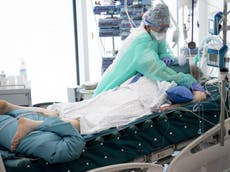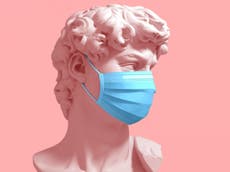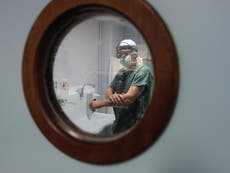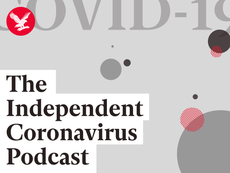We are still in the dark about coronavirus – and France finding its first case in December proves that
France got behind the lockdown, but can the government now convince citizens that it can get the country and the economy moving again successfully and safely?
As France prepares to lift its strict lockdown, the discovery that a patient at a hospital near Paris had Covid-19 in late December, almost a month before France’s first officially confirmed cases, highlights how little is still known about the disease.
A team led by Yves Cohen, the head of an intensive care unit at the Jean-Verdier hospital in Bondy, retested some old samples, uncovering the bombshell just before lockdown restrictions are due to start easing.
Amirouche Hammar, 43, was admitted to hospital with chest pains and difficulty breathing. He recovered after a stay in intensive care but got no clear answers at the time from doctors about what had made him ill.
He told BFMTV on 5 May that he was “surprised” to find out that he had Covid-19. Hammar had not travelled abroad, but his wife Fatiha, who did not have any symptoms, worked in a supermarket near Charles de Gaulle Airport, often serving customers still carrying their suitcases.
The World Health Organization (WHO) has called on other countries to retest patient samples from late 2019 and early 2020 to better understand the origins and early spread of the virus.
As European governments attempt to convince their citizens that they have the next phase under control, a discovery that raises more questions than it answers deals a blow to their credibility.
In France, to the surprise of many, one of the most restrictive lockdowns in Europe has been largely respected. For almost eight weeks now, non-essential businesses have been shut and citizens have had to fill in a form every time they leave the house, but from May 11 they won’t need the form and schools and non-essential businesses will gradually re-open.
A red-amber-green map published on May 7 will determine by how little or how much restrictions are eased in each department, based on how the virus is circulating and ICU capacity.
Covid-19 has killed more than 25,500 people in France, but the lockdown has slowed its spread. Intensive care patient numbers are falling and government statistics show a peak in excess mortality at the start of April that has since declined.
Opening up schools is key to France’s plan to get the country moving again and seen as important to avoid social inequalities widening.
But rates of transmission between children are not fully understood, with recent studies in France and Germany seeming to show contradictory results.
France’s teachers’ unions don’t believe a return to school from 11 May can be achieved safely and in line with the daunting 54-page document distributed to schools that calls for masks for adults, small groups of pupils, no more ball games at break time and crayons and toys to be disinfected after each use, among other measures.
More than 300 mayors from the Ile-de-France region, which includes Paris, have written to President Emmanuel Macron saying it should be postponed, a plea he has rejected.
France got behind the lockdown, but can the government now convince citizens that it can get the country and the economy moving again successfully and safely?
Entering lockdown was, by definition, swift and decisive.
Easing out into some form of freedom is much more complicated.
In Spain and Italy, where lockdown rules are just beginning to ease, governments are also attempting to balance the need to get their economies moving again after a catastrophic two months, and the risk that more social and economic activity may spark a second wave of infections.
“We can’t keep saying for months and months: ‘life is suspended’,” Macron said in a recent TV interview broadcast live from a primary school classroom in Poissy, near Paris.
Perched on a wooden desk, Macron referred to the “massive economic shock” the virus had caused and that over the next few weeks, France must proceed with caution.
“We had to decide on this unprecedented lockdown. Now a new phase is beginning in which we will have to try to keep manage this epidemic while the country lives the life of a free nation,” he said. Restaurants, cafés, concert halls and theatres must stay closed for now and major international travel will be limited during the summer, Macron added.
That note of caution on travel is no surprise, but will hurt France and Paris, the world’s top tourist destination, where mayor Anne Hidalgo has floated plans including blocking off some streets to allow café terraces space for social distancing, thinking ahead to the next step of the city’s return to life.
“We are only at the start of the economic and social crisis,” Macron said. “No one knows how long we are going to have to live with the virus.”
New and surprising discoveries about the virus itself that call into question the little that we thought we knew only add to that uncertainty.








Join our commenting forum
Join thought-provoking conversations, follow other Independent readers and see their replies